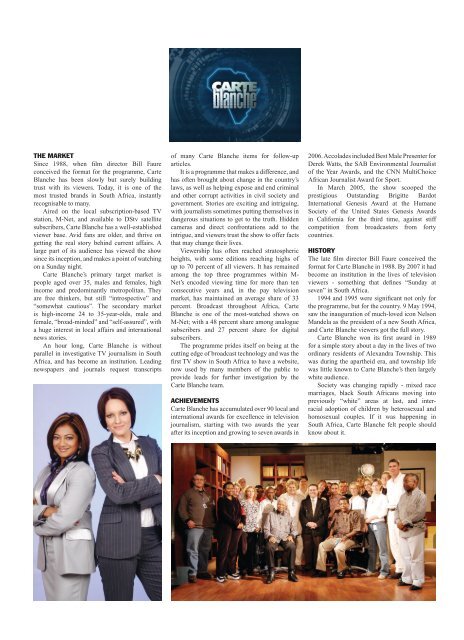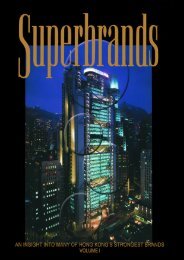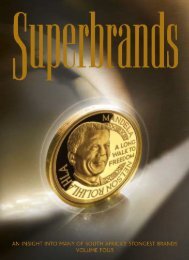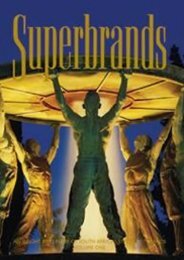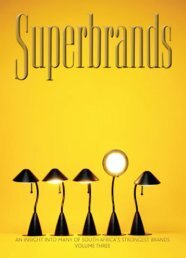South Africa Edition 2
You also want an ePaper? Increase the reach of your titles
YUMPU automatically turns print PDFs into web optimized ePapers that Google loves.
THE MARKET<br />
Since 1988, when film director Bill Faure<br />
conceived the format for the programme, Carte<br />
Blanche has been slowly but surely building<br />
trust with its viewers. Today, it is one of the<br />
most trusted brands in <strong>South</strong> <strong>Africa</strong>, instantly<br />
recognisable to many.<br />
Aired on the local subscription-based TV<br />
station, M-Net, and available to DStv satellite<br />
subscribers, Carte Blanche has a well-established<br />
viewer base. Avid fans are older, and thrive on<br />
getting the real story behind current affairs. A<br />
large part of its audience has viewed the show<br />
since its inception, and makes a point of watching<br />
on a Sunday night.<br />
Carte Blanche’s primary target market is<br />
people aged over 35, males and females, high<br />
income and predominantly metropolitan. They<br />
are free thinkers, but still “introspective” and<br />
“somewhat cautious”. The secondary market<br />
is high-income 24 to 35-year-olds, male and<br />
female, “broad-minded” and “self-assured”, with<br />
a huge interest in local affairs and international<br />
news stories.<br />
An hour long, Carte Blanche is without<br />
parallel in investigative TV journalism in <strong>South</strong><br />
<strong>Africa</strong>, and has become an institution. Leading<br />
newspapers and journals request transcripts<br />
of many Carte Blanche items for follow-up<br />
articles.<br />
It is a programme that makes a difference, and<br />
has often brought about change in the country’s<br />
laws, as well as helping expose and end criminal<br />
and other corrupt activities in civil society and<br />
government. Stories are exciting and intriguing,<br />
with journalists sometimes putting themselves in<br />
dangerous situations to get to the truth. Hidden<br />
cameras and direct confrontations add to the<br />
intrigue, and viewers trust the show to offer facts<br />
that may change their lives.<br />
Viewership has often reached stratospheric<br />
heights, with some editions reaching highs of<br />
up to 70 percent of all viewers. It has remained<br />
among the top three programmes within M-<br />
Net’s encoded viewing time for more than ten<br />
consecutive years and, in the pay television<br />
market, has maintained an average share of 33<br />
percent. Broadcast throughout <strong>Africa</strong>, Carte<br />
Blanche is one of the most-watched shows on<br />
M-Net; with a 48 percent share among analogue<br />
subscribers and 27 percent share for digital<br />
subscribers.<br />
The programme prides itself on being at the<br />
cutting edge of broadcast technology and was the<br />
first TV show in <strong>South</strong> <strong>Africa</strong> to have a website,<br />
now used by many members of the public to<br />
provide leads for further investigation by the<br />
Carte Blanche team.<br />
ACHIEVEMENTS<br />
Carte Blanche has accumulated over 90 local and<br />
international awards for excellence in television<br />
journalism, starting with two awards the year<br />
after its inception and growing to seven awards in<br />
2006. Accolades included Best Male Presenter for<br />
Derek Watts, the SAB Environmental Journalist<br />
of the Year Awards, and the CNN MultiChoice<br />
<strong>Africa</strong>n Journalist Award for Sport.<br />
In March 2005, the show scooped the<br />
prestigious Outstanding Brigitte Bardot<br />
International Genesis Award at the Humane<br />
Society of the United States Genesis Awards<br />
in California for the third time, against stiff<br />
competition from broadcasters from forty<br />
countries.<br />
HISTORY<br />
The late film director Bill Faure conceived the<br />
format for Carte Blanche in 1988. By 2007 it had<br />
become an institution in the lives of television<br />
viewers - something that defines “Sunday at<br />
seven” in <strong>South</strong> <strong>Africa</strong>.<br />
1994 and 1995 were significant not only for<br />
the programme, but for the country. 9 May 1994,<br />
saw the inauguration of much-loved icon Nelson<br />
Mandela as the president of a new <strong>South</strong> <strong>Africa</strong>,<br />
and Carte Blanche viewers got the full story.<br />
Carte Blanche won its first award in 1989<br />
for a simple story about a day in the lives of two<br />
ordinary residents of Alexandra Township. This<br />
was during the apartheid era, and township life<br />
was little known to Carte Blanche’s then largely<br />
white audience.<br />
Society was changing rapidly - mixed race<br />
marriages, black <strong>South</strong> <strong>Africa</strong>ns moving into<br />
previously “white” areas at last, and interracial<br />
adoption of children by heterosexual and<br />
homosexual couples. If it was happening in<br />
<strong>South</strong> <strong>Africa</strong>, Carte Blanche felt people should<br />
know about it.


